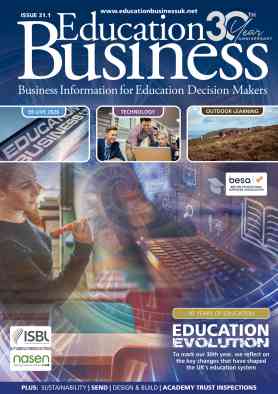Changing behaviours – how education can benefit in the long run
 Procurement behaviour in the education sector is changing. After high-profile procurement fraud stories, such as those investigated by Northern Ireland’s Department of Education in 2010, the education sector has had to become smarter. Whether it’s the risk of dodgy contractors placing second-hand burners into schools or sloppy procurement and supply management as in the Northern Ireland cases, public money is now more precious than ever and there is a greater need to use valuable resources more wisely. With education having a total spend of about £46.5 billion according to recent Government figures, the savings from the public purse could be huge.
Procurement behaviour in the education sector is changing. After high-profile procurement fraud stories, such as those investigated by Northern Ireland’s Department of Education in 2010, the education sector has had to become smarter. Whether it’s the risk of dodgy contractors placing second-hand burners into schools or sloppy procurement and supply management as in the Northern Ireland cases, public money is now more precious than ever and there is a greater need to use valuable resources more wisely. With education having a total spend of about £46.5 billion according to recent Government figures, the savings from the public purse could be huge.
Of course it’s not just wisdom that’s needed. Creativity, innovation, tenacity, steely nerves and a move towards a strategic approach to procurement, not merely tactical, will bring the rewards and value much-needed.
Collaboration
Collaborative procurement has worked for many. Figures quoted from a recent Times report state huge savings: from £70 million saving in a consortia with a combined spending power of £500 million, to savings of 16 per cent of travel costs by purchasing air fares weeks, rather than days in advance.
Mike Brooks, general secretary of the National Association of Head Teachers was quoted in 2010 as saying that schools needed to learn to share resources and collaborate more widely than has previously been the case. But how can it be done, when there are different needs, different cultures and different ideas to contend with?
Understanding the process
What do you want? The first step is to understand what your needs are. Is it immediate savings, or better quality goods or services? Be clear from the outset, and you’re less likely to encounter difficulties later on.
Do you have the skills you need? If you have started a consortium of other like-minded departments and education establishments, do you have the necessary collective skills to make the arrangement work? This is where looking at additional professional procurement help would be beneficial.
Understanding individual drivers: what are the driving forces of each of the partners in your collaborative venture? Are the goals the same or widely different? The drivers could be risk reduction, enhancing technology or improving quality of current services.
Making it clear from the beginning what knowledge can be shared and passed on is vital. There will be fewer misunderstandings later when the stakes are higher.
Know your suppliers: are your usual suppliers on board with the new arrangements? Can they provide additional creative ideas and innovative approaches to help make it work?
Risking it
Developing a risk strategy will prevent headaches further on, and will help you be prepared for the (almost) unexpected. Are there some issues you would need to handle with other partners, or would you need to go it alone?
Sometimes relationships sour, even with the best will in the world, circumstances change. Understanding the implications of leaving the arrangement, will result in clarity for everyone at the beginning of the whole process.
If true collaboration is to work, then getting commitment from all sides and all areas is a must. Are collaborative approaches embedded in policies, procedures and processes elsewhere in your organisation? This will keep behaviours aligned to agreed objectives.
Barriers to success
If they’re internal, a review of which obstacles can be removed will give you confidence. They could be technical systems that can’t be changed and need to be by-passed, or policies that just need re-writing.
A leader has made roles. Sometimes it’s making a decision when the group is going round in circles, at other times is cajoling and persuading when partners are misaligned. The right mix of hard and soft skills in the right individual is essential.
A good mix of private and public sector partners can be a powerful force in meeting your objectives and achieving your goals. Be transparent in your dealings though.
Develop supplier selection processes: if one of your partners has an established system that works, then check it out first. You can always tweak if necessary.
Support and advice
The education sector should be aware of its combined purchasing power and how to achieve better quality products and services through a collaborative approach. A bit of support and advice is also useful, so if collaboration is a possibility, sharing the value one procurement and supply professional can offer, and take advantage of economies of scale means everyone wins.
Collaboration is nothing without negotiation and influencing skills. Those traditionally soft skills will need to come out to play and bring transparency and openness to the table, whether negotiating a cost reduction, or finding suppliers with a good record in sustainable sourcing. A professional can also increase quality levels in goods and services – they know what to look for. Share an expert, it will bring dividends.
There are cries from every corner – the public sector needs to learn more about cooperation, from the National Audit Office, to the Audit Commission. It only takes commitment and hard work to make it happen. Just, I say, though there’s no doubt that there are severely challenging times ahead for the sector. Smart procurement is not just about driving down costs. It’s securing quality, using benchmarks for the best possible solutions and getting the best quality products and services with what the budget allows. It can be done.
In Northern Ireland, the education minister Catriona Ruane ordered an investigation into how professional procurement and supply chain practices were being conducted and made necessary changes. Using best practice and being open and clear, and transparent in your collaborative venture will make for a fruitful experience.
Successful procurement at a glance
• Collaboration is key and will bring benefits in cost reduction and value creation
• Understand what you need as a group, and set out objectives and goals accordingly
• Understand the motivations in all your partners.
• Share knowledge, be open and transparent, but be mindful of the limitations to that sharing
• Know your risks and the barriers to success
• Choose your leaders and your suppliers carefully.
Latest News
11/02/2026 - 10:53
The government has launched its new ten-year Education Estates Strategy, backed by £1 billion.
10/02/2026 - 09:47
Spending on schools across Scotland has increased by more than £1 billion in real terms over the past decade, statistics show.
10/02/2026 - 09:34
New training to empower school staff to improve mental health and wellbeing support for neurodivergent students has been launched by Anna Freud, a mental health charity transforming care for children and young people.
09/02/2026 - 09:58
Data from BAE Systems’ annual Apprenticeship Barometer found that 63% of parents said they would prefer their child to choose an apprenticeship over a degree after school.
06/02/2026 - 09:59
The work builds on guidance launched by Cardiff Council in autumn 2025, which provides clear and practical advice for schools responding to incidents where weapons are brought onto school premises.







